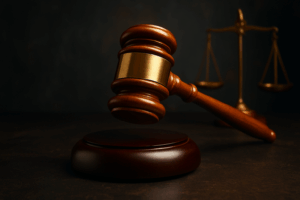Harvard University has successfully secured a temporary block against the Trump administration's efforts to decertify its eligibility for the Student and Exchange Visitor Programme (SEVP), allowing international students to continue their studies amid ongoing legal proceedings.
Legal Battle Begins as Harvard Defends International Enrollment Against Government Challenge

Legal Battle Begins as Harvard Defends International Enrollment Against Government Challenge
A federal judge temporarily blocks Trump's administration attempt to revoke Harvard's certification for hosting international students, igniting a larger conversation on academic freedom and free speech.
In a pivotal moment for academic institutions across the nation, Harvard University has received a reprieve as a judge intervenes in a contentious legal clash with the Trump administration. The dispute arose after the Department of Homeland Security (DHS) issued a notice indicating its intent to withdraw Harvard's certification under the Student and Exchange Visitor Programme (SEVP), which is essential for allowing international students to study in the U.S. A federal judge, Allison Burroughs, ruled that the university could continue its enrollment of international students while the legal battle unfolds, a decision that highlights critical issues regarding academic freedom and government oversight.
As part of the ongoing litigation, Harvard has been granted 30 days to comply with DHS requirements, following a previous revocation of its SEVP certification that sparked a swift legal response from the university. The case not only affects thousands of international students at Harvard but also resonates with other institutions that closely monitor the situation. Legal experts argue that the government's action may be viewed as an infringement on First Amendment rights, as it appears motivated by ideological conflicts.
The legal tensions stem, in part, from accusations directed at Harvard regarding its perceived bias against certain viewpoints, as articulated in a series of letters from the Trump administration. Critically, these claims raise significant questions about the extent to which the government can control academic environments and the diversity of thought within educational institutions. The implications of this case could lead the way to higher courts, influencing the dialogue surrounding the intersection of academia, free speech, and government authority.
Furthermore, critics of the Trump administration's actions emphasize the chilling effect on university enrollment of international students, suggesting that the administration’s measures may deter potential applicants. The legal framework surrounding student visas remains complex, historically shaped by national security concerns and evolving perceptions of ideological threats. As this landmark case proceeds, it will undoubtedly reflect the broader challenges faced by academic institutions navigating governmental pressures and the fundamental principles of free expression.
As part of the ongoing litigation, Harvard has been granted 30 days to comply with DHS requirements, following a previous revocation of its SEVP certification that sparked a swift legal response from the university. The case not only affects thousands of international students at Harvard but also resonates with other institutions that closely monitor the situation. Legal experts argue that the government's action may be viewed as an infringement on First Amendment rights, as it appears motivated by ideological conflicts.
The legal tensions stem, in part, from accusations directed at Harvard regarding its perceived bias against certain viewpoints, as articulated in a series of letters from the Trump administration. Critically, these claims raise significant questions about the extent to which the government can control academic environments and the diversity of thought within educational institutions. The implications of this case could lead the way to higher courts, influencing the dialogue surrounding the intersection of academia, free speech, and government authority.
Furthermore, critics of the Trump administration's actions emphasize the chilling effect on university enrollment of international students, suggesting that the administration’s measures may deter potential applicants. The legal framework surrounding student visas remains complex, historically shaped by national security concerns and evolving perceptions of ideological threats. As this landmark case proceeds, it will undoubtedly reflect the broader challenges faced by academic institutions navigating governmental pressures and the fundamental principles of free expression.




















